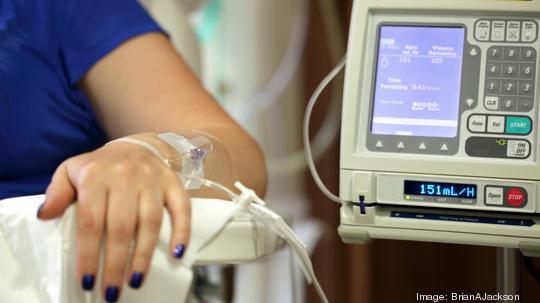
In medicine, human error is like a plague: It spreads easily and kills often.
Recent studies of medical errors estimate that they could account for as many as 251,000 deaths annually in the US, making medical errors the third leading cause of death. And though technology can help to reduce these medical mistakes, it can also exacerbate them.
IV infusion pumps hold significant potential for these errors. Many pumps have confusing interfaces, inefficient alarm systems, and complex programming protocols. A multihospital study published in BMJ Quality & Safety in 2016 found that 60 percent of IV infusions had at least one error associated with their administration (although the same study notes that very few of these were potentially harmful).
Ivenix, a biotech startup based in North Andover, aims to change that. The company's infusion pump, or "infusion system" as Ivenix prefers to call it, has an interface similar to a smartphone. Some of its features include an easily adjustable height, a drug library that automatically recommends dosages, and a feature that automatically sends patient info to electronic health record systems. “We think we can really make a dent in those adverse drug events which are just all over the place in healthcare today,” said Susan Niemeier, Ivenix’s chief nursing officer.
Ivenix was founded about seven years ago as a rebranding of Fluidnet Corporation. It is backed by several large investors, including FPrime and Wuxi Tech.
On June 11, Ivenix received 510(k) clearance from the Food and Drug Administration (FDA), a goal Ivenix’s team had been working toward for three years.
In 2014, the FDA put together a strict new clearance policy for infusion pumps. It required new companies to demonstrate that their product was safe under all conditions and to ensure that any user, trained or untrained, could operate the pump without making any critical mistakes. In addition, it highlighted cybersecurity, requiring innovators to keep their product safe from hackers. By the end of the FDA clearance process, Ivenix had submitted 50,000 pages of documentation and performed thousands of hours of product testing.
"Our biggest thrill, I know for me personally, will be seeing this on a patient because we've been longing for that," said Niemeier.
At the center of Ivenix’s usability is its smartphone-like interface, which is designed to be as clear and intuitive as possible. This is different from most infusion pumps, which usually require more complex programming. “Everyone else is like a flip phone,” said George Gray, chief technology officer at Ivenix. “And we’re the iPhone.”
It's worth noting that smart pumps have enjoyed wide use for more than a decade, although many are outdated in both their hardware and software design. According to a national survey conducted by the American Society of Health-System Pharmacists in 2012, 77 percent of hospitals in the US use smart pump technology—and smart pumps alone do not necessarily drive down errors, the researchers noted. A separate study, published in 2015 in Nursing Management, called for "urgent" innovation in smart pumps, noting that many errors occurred because nurses were overriding pump interfaces because of the complexity of the user interface and the time it takes to program.
Ivenix's team plans to lower the typical cost of ownership for infusion pumps. “We looked at all the costs associated with owning and operating a pump and we asked, ‘How do we reduce that?'” said Niemeier. “That’s essential for any hospital today.” Although a specific price has yet to be set, Ivenix plans to provide its product at 40 percent of the average infusion pump ownership cost.
In the future, the startup aims to expand its product line into various kinds of infusion pumps, such as syringe and ambulatory pumps.
“We firmly believe that health care is moving to the home, so we’ll use our whole infrastructure and our cloud to get the technology out to the home,” said Gray. Right now, Ivenix is prioritizing commercialization and getting its product into as many hospitals as possible.








